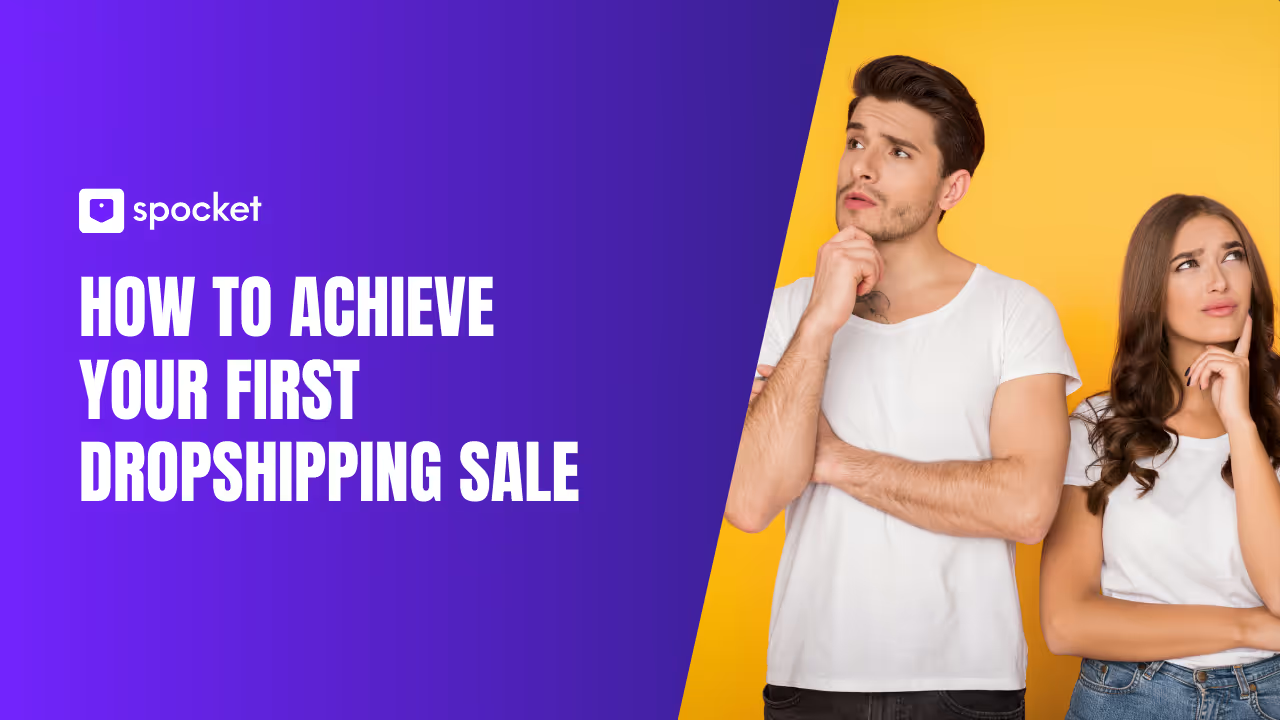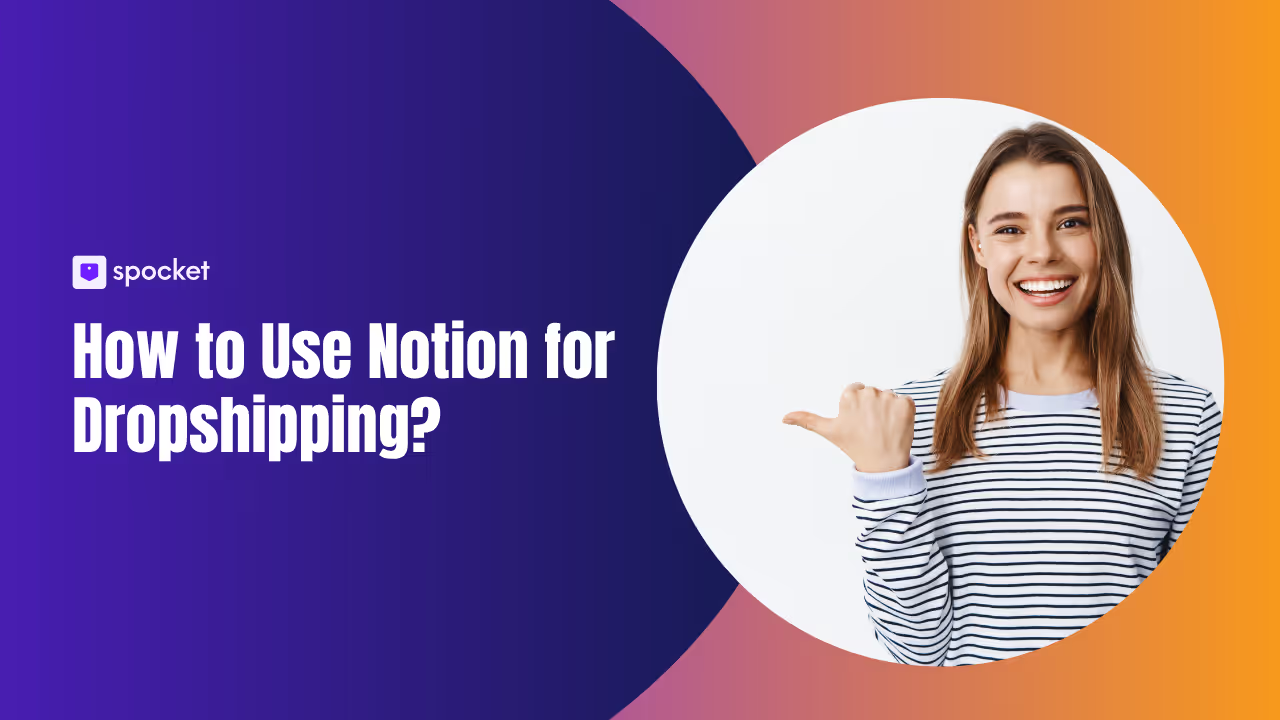Are you ready to make your first dropshipping sale in 2026? It’s the ultimate milestone for any new dropshipper! But the journey to your first sale doesn’t have to be complicated. With the right strategies, you can start seeing sales quickly. Whether you're just getting started or struggling to get that first sale, this guide will walk you through proven techniques that will help you boost sales and build a sustainable business. From selecting the right products to mastering marketing, we’ve got you covered. Ready to dive in? Let’s unlock the secrets to success and make your first dropshipping sale happen!
Why Making Your First Sale is Crucial
Making your first dropshipping sale is more than just a milestone—it’s your ticket to success. When you make that first sale, it’s not only proof that your business works, but it’s also the moment that transforms your idea into a reality. It builds your confidence and shows that your marketing, products, and website are connecting with customers.
Did you know that businesses making their first sale within the first month have a higher chance of becoming profitable in the first year? That’s because your first sale unlocks more than revenue—it opens the door to social proof, customer trust, and growth. So, how do you go from zero to your first sale? Keep reading to discover the exact strategies you can use to boost your chances and get that first sale in 2026!
Top Strategies to Make Your First Dropshipping Sale
Making your first dropshipping sale is achievable with the right strategies. Focus on selecting a profitable niche, optimizing product pages for SEO, and using marketing tactics like social media ads and email campaigns. Offering promotions and leveraging social proof will help convert visitors into customers. These strategies will not only help you make your first sale but also lay the foundation for long-term success. Let’s explore the top strategies to kickstart your dropshipping journey.
1. Choosing the Right Niche to Boost Sales
Picking the right niche is crucial for making your first dropshipping sale. In 2026, finding the right products and targeting the right market can set you up for success.
Research Market Trends and Demand
To find trending dropshipping products, use tools like Google Trends, TrendHunter, and AliExpress Hot Products. These show what’s in demand, giving you a clear advantage. Market research tools like Jungle Scout and SEMrush can help you pinpoint products with high potential, making it easier to secure your first sale.
Analyze Your Competition
Study your competitors to identify gaps you can fill. Tools like SpyFu and SimilarWeb let you track competitors’ strategies. Find areas where you can offer more value or service—this helps you stand out and attract customers, making your first sale more likely.
Focus on Passion and Problem-Solving Products
Selling products people are passionate about or that solve common problems increases your chances of success. Focus on products that solve everyday issues—like health or eco-friendly products—that people are eager to buy. Passion-driven products lead to repeat sales and loyal customers.
2. Optimize Your Product Selection Strategy
Choosing the right products is key to making your first dropshipping sale. In 2026, selecting the right products will give you the edge you need to succeed. Here’s how to pick the best items for your store and boost your sales.
Choose Products with High Perceived Value
To capture attention and encourage purchases, focus on products with high perceived value. It's not just about the price—it's about how customers view the product. Items that look premium or offer something unique, like eco-friendly gadgets or customized accessories, tend to create excitement and trust. When customers believe a product is valuable, they’re more likely to buy.
Avoid Oversaturated Markets
Don’t get lost in a crowded market. Look for niches that have demand but are not flooded with competition. Use tools like Google Trends and AliExpress to identify gaps where you can stand out. Choosing a niche with less competition increases your chances of making that first sale without fighting for visibility.
Focus on High-Profit Margin Products
While low-priced products might seem appealing, high-profit margin products help build a more sustainable business. Focus on items that offer strong margins—typically in the $20-$70 range. This ensures that after factoring in shipping, advertising, and other costs, you’re still making a healthy profit. High-margin products allow for growth and reinvestment into your business.
3. Creating a Professional and Trustworthy Online Store
To make your first dropshipping sale in 2026, your store must look professional and build trust. A well-designed, credible store can turn visitors into loyal customers. Here’s how you can optimize your online store for success.
Implement a Mobile-Friendly, Clean Design
A cluttered design can drive potential buyers away. In 2026, most shoppers browse on mobile, so a clean, mobile-friendly design is a must. A simple, easy-to-navigate layout improves user experience, boosts trust, and increases conversions. Make your site sleek, responsive, and fast-loading to keep visitors engaged and ready to purchase.
Write Persuasive Product Descriptions
Your product descriptions should do more than list features—they should tell a story. Focus on the benefits of each product and explain why it solves a customer’s problem. A compelling description builds desire and pushes customers closer to buying. Make sure to highlight key selling points that resonate with your audience.
Add Social Proof and Trust Signals
Shoppers trust reviews. Display customer testimonials, ratings, and product reviews prominently on your pages. Add trust signals like secure payment badges and money-back guarantees to reassure customers. Social proof encourages hesitant buyers to make their first purchase.
Simplify the Checkout Process
A complicated checkout process can lead to cart abandonment. To make your first dropshipping sale, keep it simple. Minimize the number of steps and allow for guest checkouts. Ensure the payment process is quick and secure. Display all costs upfront to avoid surprises at the end. The easier you make it for customers to buy, the more likely they are to complete the transaction. Streamlined checkout = higher conversion rates.
4. Marketing Your Products Effectively
To make your first dropshipping sale in 2026, you need an effective marketing strategy that drives traffic and boosts conversions. Here’s how to market your products smartly.
Leverage Social Media for Organic Traffic
Social media is a goldmine for organic traffic. Focus on platforms like Instagram, Facebook, and TikTok to showcase your products. Post engaging, high-quality content and use targeted hashtags to attract your audience. The key is consistency—start with one or two platforms where your target customers are most active. It’s a cost-effective way to build brand awareness and generate interest in your products.
.avif)
Engage with Your Target Audience
Engagement is everything! Respond to comments, run polls, and create content that sparks conversations. Engaging with your audience builds trust and loyalty, encouraging them to make a purchase. The more you connect, the more likely you are to turn followers into customers.
Use Facebook and Instagram Ads
Want quick results? Run Facebook and Instagram ads to reach a wider audience. Set clear goals—whether it’s traffic or sales—and target your ads to specific demographics. Create visually appealing ads with a strong call to action, and test different variations to see what works best. Ads can drive your first sale fast when targeted correctly.
5. Utilize Influencer Marketing to Expand Your Reach
Influencer marketing is a powerful tool to boost your first dropshipping sale. Here’s how to leverage it effectively and drive sales in 2026.
.avif)
Find Micro-Influencers for Affordable Partnerships
Micro-influencers are key to affordable and effective marketing. They have engaged audiences that trust their recommendations. Look for influencers in your niche with a loyal following and offer them products or commissions for promotion. Their smaller, more engaged audience means higher trust and better conversion rates—perfect for making your first sale.
Create Trackable Campaigns with Custom Discount Codes
Make it easy to track your influencer success by offering custom discount codes. This lets you measure sales from each influencer’s promotion, helping you find out what works best. Discount codes also drive urgency, encouraging followers to buy. Track results to optimize future campaigns and scale your efforts for bigger success.
6. Master Search Engine Optimization (SEO) from the Start
SEO is your key to making your first dropshipping sale. It boosts your visibility, driving traffic to your store and increasing sales. Here’s how to get started.
Use Long-Tail Keywords to Capture Targeted Traffic
Long-tail keywords help you rank for specific, low-competition terms. Instead of targeting broad keywords, focus on phrases like “eco-friendly gadgets dropshipping.” These phrases attract customers who are ready to buy and give you a better chance of making that first sale. Incorporating long-tail keywords into your product pages drives high-intent traffic straight to your store.
Optimize Product Pages for Search Engines
Make your product pages SEO-friendly to improve rankings. Optimize your titles, descriptions, and images with relevant keywords. Focus on clear, compelling descriptions that sell while also helping with SEO. Don’t forget about image alt text and fast page loading times—they play a role in boosting your rankings and user experience.
Build a Content Marketing Strategy
Start a blog to drive organic traffic. Share helpful content like “How to Pick the Best Dropshipping Products” and link to your products. Not only does it help with SEO, but it also builds trust and positions your store as a go-to resource. Regularly adding content keeps your store visible and attracts customers who are ready to buy.
7. Utilize Paid Advertising for Quick Wins
Paid advertising is one of the fastest ways to make your first dropshipping sale in 2026. It puts your products directly in front of potential buyers and drives traffic quickly. Here’s how to use ads effectively for fast results.
Launch Google Ads for Product Discovery
Google Ads helps you target customers actively searching for your products. Set up a Google Shopping campaign to showcase your products in search results. Make sure your product titles, descriptions, and images are SEO-optimized. With Google Ads, you capture high-intent traffic and increase your chances of making your first sale quickly.
Run Facebook and Instagram Ads
Facebook ads and Instagram ads are perfect for targeting your ideal customers. Create eye-catching ads that highlight your products and target specific demographics. Use carousel or video ads for more engagement, and keep your call-to-action clear. By testing and optimizing your ads, you can quickly drive traffic and make your first sale.
8. Build Email Marketing Foundations
Email marketing is essential for making your first dropshipping sale in 2026. With the right strategies, you can nurture leads and boost conversions quickly.
Create Pre-Launch Email Sequences
Start building excitement with pre-launch email sequences. Offer sneak peeks of your products or an exclusive discount for signing up. These emails help you gather interested subscribers who are ready to purchase once your store launches, increasing the chances of making your first sale faster.
Design Abandoned Cart Recovery Emails
Recover lost sales by setting up abandoned cart recovery emails. Send automated reminders to customers who leave items in their cart, offering them a discount or free shipping to seal the deal. These emails can significantly increase conversions and help you get that first sale.
9. Build Customer Trust with Reviews and Social Proof
Building trust is crucial for making your first dropshipping sale. Social proof, like reviews and testimonials, plays a key role in convincing potential customers that your products are worth buying. Here’s how to leverage trust-building tools to boost conversions.
Collect and Display Customer Reviews
Customer reviews are powerful social proof. Displaying positive reviews on your product pages shows potential buyers that others have trusted you and are satisfied with their purchase. Positive feedback increases trust and reassures hesitant shoppers, making them more likely to complete their purchase. The more reviews you collect, the more credible your store becomes, increasing your chances of making that first sale.
Use Testimonials for Building Credibility
Testimonials go a long way in building credibility. Feature detailed feedback from happy customers to show real-life experiences with your products. Adding testimonials on your homepage or product pages helps create a connection with new customers, encouraging them to trust your store. To make the most of these conversions, lead management software can help track and nurture interested customers, ensuring that positive experiences translate into repeat sales and long-term relationships.
10. Offer Limited-Time Promotions to Create Urgency
Creating a sense of urgency can encourage customers to make their first dropshipping purchase quickly. Limited-time promotions and exclusive offers are proven strategies to boost conversions and drive sales. Let’s explore how to make urgency work for you.
Flash Sales and Discounts
Flash sales are a great way to create urgency. Offer time-sensitive discounts or limited-stock promotions to push customers to act fast. Use countdown timers to show how much time is left, making customers feel the need to buy before the deal expires. Flash sales not only drive immediate traffic but also increase conversion rates, helping you make your first sale faster.
Create Exclusive First-Time Buyer Discounts
Reward new customers with an exclusive discount for making their first purchase. Offering a special deal, like “10% off your first order,” encourages customers to take the plunge. First-time buyer discounts build goodwill and increase the likelihood of a purchase. It’s a great way to make your first sale while also creating a positive relationship with your customers.
.avif)
11. Analyze Your Data and Optimize for Continuous Growth
To make your first dropshipping sale and keep growing, analyzing your data is crucial. By tracking performance and optimizing strategies, you can continuously improve your store’s sales and efficiency. Here's how to do it.
Track Key Metrics to Measure Performance
Understanding your store’s performance starts with tracking the right metrics. Monitor key indicators like conversion rate, traffic sources, cart abandonment rate, and average order value. By keeping track of these, you can identify areas for improvement and adjust your strategies accordingly. This data will give you clear insights into what’s working and what needs adjustment, helping you make informed decisions that boost sales.
Use A/B Testing for Optimization
A/B testing is essential for optimizing your store. Test different versions of product pages, ads, and email campaigns to see which one performs better. By changing one element at a time (like the headline or call-to-action), you can measure its impact and find out what works best for your audience. Regular testing helps you refine your approach and improve conversions over time.
Scale Successful Strategies
Once you find what works, scale it! If certain ads, products, or strategies are driving sales, put more focus and resources into them. Whether it’s increasing your ad budget, expanding to new markets, or refining your email marketing, scaling successful strategies lets you maximize your efforts and drive sustained growth. Keep optimizing and scaling, and your dropshipping store will continue to grow.
Conclusion
Making your first dropshipping sale in 2026 is entirely achievable with the right strategies. From selecting the perfect niche to leveraging paid ads, building trust, and optimizing your store, each step is vital in driving success. By following these proven tactics and continuously analyzing your performance, you’ll not only make your first sale but build a sustainable business. Ready to get started? Spocket is the perfect platform to kick off your dropshipping journey with its reliable suppliers and seamless integration, making it easier than ever to start selling. Let Spocket help you grow your business today!






































